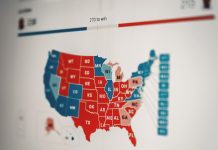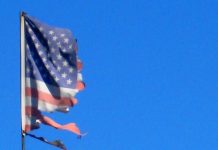November mid-term elections are just around the corner, and the voter-suppression machine has just been oiled, cleaned, and fired up.
Ten years ago the Republican party was licking its wounds after the country elected its first African American president and Democrats controlled both houses of Congress.
So Republicans came up with a strategy: concentrate on 16 states and gerrymander them so badly Democrats have little to no mathematical chance of winning in the 2010 mid-term elections.
And it worked. Republicans reclaimed their lost seats, and have held them ever since. Now they have the White House too.
But Republicans had another, more insidious strategy. They knew they couldn’t come right out and criminalize voting, so they devised ways to make casting ballots harder, more inconvenient, frustrating, hoping people would stay home rather than go through all the trouble to practice their civic duty.
That’s when the term “voter fraud” started circulating around right-wing media. Simply accuse random people (mostly immigrants) of voting illegally, and enough “patriots” would rise up in an altruistic fervor to fortify the most fundamental of democratic institutions against those who seek to denigrate it. Some (Republican) states began instituting “voter I.D.” laws, requiring birth certificates, drivers’ licenses, passports, for the right to vote. After all, minorities vote primarily for Democrats. If they are to preserve their hegemony, Republicans must take evasive measures.
Voter fraud, however, is a myth.
Voter suppression is very much alive in America, and Republican states are engaging in it in order to purge the voting roles.
As we speak, a courtroom in Kansas City, Kansas is hearing a case involving Kansas Secretary of State, Kris Kobach, the mastermind behind the “Interstate Voter Registration Crosscheck Program.”
In 2013, Kobach boasted his Crosscheck system uncovered 697,537 “potential duplicate voters” in fifteen states. Those “potential duplicate voters” are listed by first and last names only on the supposition they are running around from state to state on election day casting multiple ballots. Everyone with that first and last name is kicked off subsequent nationwide voter roles irrespective of other identifying information, such as Social Security numbers, addresses, or birth dates.
Investigative reporter Greg Palast, in his Rolling Stone piece “The G.O.P.’s Stealth War Against Voters,” said:
“The Crosscheck list disproportionately threatens solid Democratic constituencies: young, black, Hispanic and Asian-American voters – with some of the biggest possible purges underway in Ohio and North Carolina, two crucial swing states with tight Senate races.”
For example, Donald Alexander Webster Jr., of Dayton, Ohio appears on the Crosscheck list a second time as Donald Eugene Webster from Charlottesville, Virginia. James Evans Johnson is listed the same as James P. Johnson. Palast reports one-fourth of the names on the list actually lack middle-name matches. The system can also mistakenly identify fathers and sons as the same voter, ignoring designations of Jr. and Sr. Hundreds of men named “James Brown” are suspected of voting or registering twice, 357 of them in Georgia alone.
Since 2011, Arizona, Alabama, and Georgia have passed proof of citizenship laws similar to Kobach’s. Courts have blocked all three states’ laws.
In 2016, The American Civil Liberties Union (ACLU) claimed the Voter Crosscheck Program violates the National Voter Registration Act of 1993, aka the Motor Voter Law.
This week, Kobach began defending his program in federal court.
Dale Ho, the ACLU’s Voting Project director and an attorney for the plaintiffs, told ThinkProgress:
“Enforcing this law is like taking a bazooka to a fly…Kobach’s position is that states can require any kind of documents they want from people when they register to vote.”
Kobach must prove beyond a reasonable doubt there are a substantial number of non-citizens on Kansas’ voter rolls, and that nothing less than a prohibitive law can stop them. However, out of millions of voters, Kobach has only convicted one non-citizen of voter fraud.
The ACLU claims that number is too inconsequential, and there are myriad other methods to keep non-citizens off the rolls that don’t involve disenfranchising the majority of eligible voters.
Kobach, a Harvard Law School-educated attorney, is representing himself in court, although his performance has been less than stellar. U.S. District Judge Julie Robinson has interrupted Kobach and his fellow attorneys to guide them through basic evidence evidence-admission procedures appropriate ways of posing questions.
Kris Kobach served along with Vice President Mike Pence on President Trump’s now defunct Presidential Advisory Commission on Election Integrity (PACEI), convened last spring to feed into Trump’s fiction about three to five-million illegal voters casting fraudulent ballots last November.
Even though Kobach is not handling this case well and the president’s commission has disbanded, voter suppression has already yielded its desired outcome. Just look at how Trump took Wisconsin in 2016. Look at Alabama. And North Carolina, Arizona, Indiana, Mississippi, Nebraska, New Hampshire, Ohio, Rhode Island, South Carolina, Tennessee, Texas, and Virginia.
In 2016, Missouri passed a restrictive voter I.D. law by ballot initiative.
Last year, legislatures in Arkansas and in North Dakota passed voter ID bills.
https://www.youtube.com/watch?v=BYzCv-niGZ4
Image credit: Raw Story





